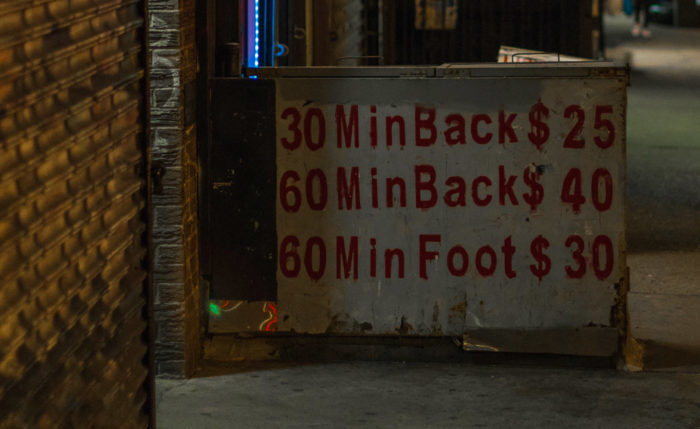Guest Author: Tomas Perez, Founder & CEO of The EPIK Project
I’m a coffee snob. Living and working near Portland, Oregon it’s delightfully easy to become one. Sadly, many small businesses like local coffee shops are facing extinction in the face of COVID-19. Thankfully, communities across the country are acutely aware of the threat to their favorite local small business and are doing all they can to support them these days. And the federal government is doing its part by directing enormous amounts of money to the same end.
 But there’s one small business in America we should let die during this pandemic. For far too long Illicit Massage Businesses or “IMB’s” have hidden in plain sight. These shady storefronts provide cover for trafficking networks and account for a growing segment of the commercial sex industry. These so-called small businesses are directly related to the exploitation of vulnerable women. They’re brick-and-mortar businesses that exist behind a thin veneer of legitimacy. They advertise therapeutic massage services, but often deliver coerced sex acts from disenfranchised, and often captive women to wealthy and powerful men who navigate this black market with impunity. The Polaris Project has identified over 9000 of these “small businesses” from coast to coast. They appear in all sorts of retail locations, generate millions in illicit profit and are often linked to trans-national organized crime. But they operate like most other small businesses, and therein lies a unique opportunity; they pay rent, incur business expenses like marketing, payroll, and transportation. They bank and have to manage employees. Shared Hope International has long held firm the position that any commercial sexual activity by minors is, by definition, domestic minor sex trafficking. Their work has resulted in significant changes in legislation to bring justice for the victims of sex trafficking, educational tools to help prevent trafficking, and working with domestic and international partners to bring restoration. Thoughtful, coordinated efforts to combat IMB exploitation is consistent with the standard set by Shared Hope.
But there’s one small business in America we should let die during this pandemic. For far too long Illicit Massage Businesses or “IMB’s” have hidden in plain sight. These shady storefronts provide cover for trafficking networks and account for a growing segment of the commercial sex industry. These so-called small businesses are directly related to the exploitation of vulnerable women. They’re brick-and-mortar businesses that exist behind a thin veneer of legitimacy. They advertise therapeutic massage services, but often deliver coerced sex acts from disenfranchised, and often captive women to wealthy and powerful men who navigate this black market with impunity. The Polaris Project has identified over 9000 of these “small businesses” from coast to coast. They appear in all sorts of retail locations, generate millions in illicit profit and are often linked to trans-national organized crime. But they operate like most other small businesses, and therein lies a unique opportunity; they pay rent, incur business expenses like marketing, payroll, and transportation. They bank and have to manage employees. Shared Hope International has long held firm the position that any commercial sexual activity by minors is, by definition, domestic minor sex trafficking. Their work has resulted in significant changes in legislation to bring justice for the victims of sex trafficking, educational tools to help prevent trafficking, and working with domestic and international partners to bring restoration. Thoughtful, coordinated efforts to combat IMB exploitation is consistent with the standard set by Shared Hope.
Heyrick Research, a Virginia based firm recently noted that current market conditions have
“…severely compromised the financial standing of illicit massage businesses (IMBs) across the country. Once considered a low-risk, highly profitable criminal enterprise, we assess nearly all IMBs will likely be approaching complete insolvency should the pandemic and near-zero buyer demand persist for five more months with many approaching insolvency much sooner.”
Their assessment paints a bleak picture for an exploitative industry that’s thrived for far too long. Even before COVID-19, communities like South Florida, Detroit, Grand Rapids, Dallas and others have been developing multiple policies and strategies that make it difficult for IMB’s to thrive.
The ugly reality of COVID-19 has provided concerned communities with an unlikely opportunity to eradicate this illicit business. Clearly “non-essential” businesses, IMB’s have been forced to lock their doors while customers are sheltered in place. A few IMB’s have the liquidity to weather this temporary situation, but most operate on thinner margins and won’t have the resources to survive. While all this is in play, now is the time to educate yourself and your local leaders on IMB’s. Consider policies like coordinating with local law enforcement to inform landlords of possible illicit activities at IMB’s on their properties and requesting their assistance in terminating leases. Encourage political leaders to protect the massage industry (a legitimate health care business) by establishing health codes for businesses offering any kind of massage-related services. Or investigate requests for SBA/COVID-19 relief funding from IMB’s. Yes. Some IMB’s may be trying to get federal money to continue their exploitative businesses! Encourage your legislators to help ensure critical pandemic resources are directed to support the victims trapped in IMB’s, and not used to prop up these harmful businesses.
IMB’s as a profitable exploitative business model is on the ropes. But the demand for commercial sex is a virus of its own; it adapts, shifts and spreads in unpredictable ways. While the demand that drives IMB’s has dried up, our work at EPIK and that of our partners at The Avery Center reveals that other forms of commercial sex continue to thrive. Online markets like webcamming and street prostitution continue to place vulnerable kids and young people in harm’s way. While there’s so much we can’t do right now to slow the overall spread of sex trafficking in America, perhaps we can use the unlikely momentum of COVID-19 to ensure that when our communities come back to life, IMB’s won’t.






